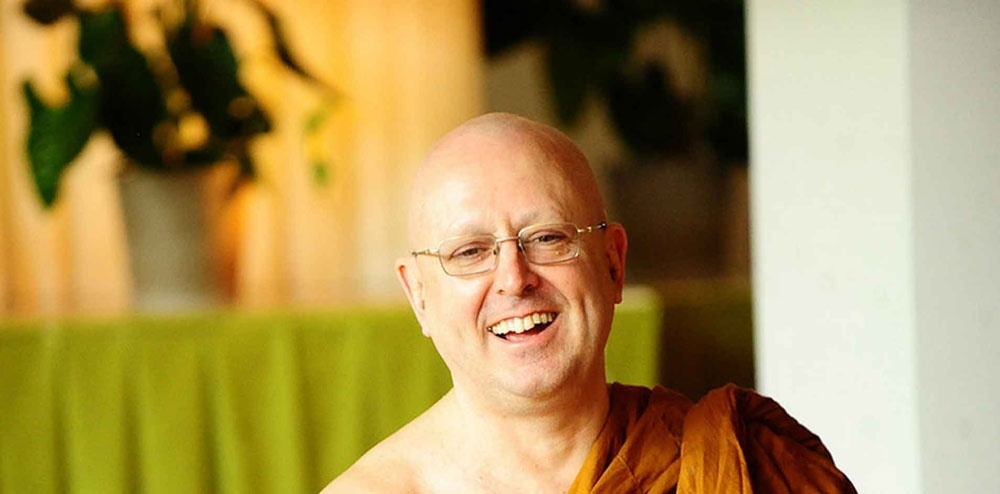
Buddhistdoor Global recently had an opportunity to sit down for an interview with Ajahn Brahm, abbot of Bodhinyana Monastery near the Australian city of Perth, and spiritual director of the Buddhist Society of Western Australia. Born in London in 1951, Ajahn Brahm completed a degree in Theoretical Physics at Cambridge University. After graduation, he taught at a high school for a year, before travelling to Thailand to ordain as a theravada monk under Ajahn Chah. Now a monastic of more than 40 years’ experience, Ajahn Brahm has written several bestsellers on mindfulness and meditation, and has given talks at the United Nations as well as the headquarters of Google and Facebook. In March, Ajahn Brahm was in Hong Kong to give a series of talks on “How to Live Happily Every Day.” With the subject of his presentation in mind, our conversation soon turned to the topic of happiness.
Buddhistdoor Global: How do you describe “living happily?”
Ajahn Brahm: To live happily is to live in peace, with acceptance, with love—not with love as in how you love a person, but how you love life. You might not always get along with your loved ones, you might argue or quibble with them, but you love them nonetheless. Similarly, life might give you a hard time, but you can always love life. We need to open the door of our hearts to life. When things get difficult we do not think, “This should have never happened.” Instead, we accept it as part of life; it is where we learn and grow. I do not call it suffering, I call it “growing pains.”
BDG: It seems as if there are more people who are “unhappy” nowadays, compared with the past. Can you explain this trend?
AB: Yes, I think there are. This has to do with expectations. So many people are unhappy today because their expectations of themselves and of life are too high. If you are not in the place you want to be right now, move where you want to be to your current situation. Adjust your expectations and then you will be satisfied with life. Where do expectations come from? From ourselves, from society, and our world. Do not listen to the world, do not worry about living up to those expectations. Listen to your heart, listen to wisdom. Where you are, should be where you want to be. That is the secret of happiness.
Don’t force yourself toward an unrealistic goal. If you have an unrealistic goal you will fail and when you fail you will feel like you are not worth anything. So lower your expectations. It is quite intuitive, but it runs counter to what we have been taught. In this world we tend to listen to what others tell us. We listen to experts, but they also don’t know. Knowledge and wisdom are always a work in progress, it is never complete.
For example, people always think that to be happy you have to be successful, which is completely wrong. And then, there are some psychologists who say that you have to be happy first and that success will follow. Neither are true. Instead, happiness is success. It is not what others think, write, or say about you; you need to be happy with yourself first. And when you can be kind and compassionate to yourself, only then can you show kindness and compassion to others.
BDG: Yes, a very sad example of the pressures of expectations are the youth suicides we hear too often about in the press. Children as young as seven end up killing themselves because they feel pressured. Can you gives us any advice that we could share with our readers on this topic?
AB: If you have children, please be kind to them. The education system here is too focused on competition. Parents need to accept that half of the children in Hong Hong have below average intelligence. This is logical, it’s what the definition of average means.
Going to a top school or university is not going to make them happy. It’s other stuff, like being together with family. What your children need is time with you. Not being told off, not having good grades or good clothes. And if they are happy, they are successful.
Children in Finland, for instance, do not start school until seven. They never have any homework and they continue to score at the top of the international education scale. They grow—they are not pushed or forced, they grow at their own rate. As much as one does not force a tree to grow faster, we should not force our children. Why do we treat our kids like products in a factory? Why do we force them to do not what they want to do, but what the parents want? Having a good time is an important part of learning. Children are inquisitive, they want to learn, but if you force them you stunt this inquisitiveness.
BDG: Nowadays, many people use meditation to cope with the stresses and worries of life, striving to obtain a bit more peace within themselves and with the world. But so often we hear from people who work and have other worries that distract them from reaching a meditative state, which often leads to even more stress. Do you have any tips for people who struggle with this?
AB: Meditation is not about outcome. It is not about obtaining something. It is about the process. When people focus on the outcome, that is when they get stressed out when meditating. When you are focused on results and outcome, that is not Buddhist at all.
Meditation is not about reaching something. We meditate not to attain anything; we meditate to let go of things. These days I say that we meditate to lose things. So great meditators are great losers. When people look at me and say, “You had a great degree from a good university and now look at you, you are a loser,” I say, “Thank you, what a great compliment.” Being a loser is my goal in life and the biggest loser was the Buddha. He had nothing left, but emptiness and freedom. That is a loser. So instead of working hard trying to meet expectations, be a loser and get lost!
See more
Bodhinyana Monastery (Buddhist Society of Western Australia)
Related features from Buddhistdoor Global
The Benefits of Meditation
Ajahn Brahm, Religion, and Science: “We must abandon the superstition of materialism”
Banning Ajahn Brahm’s speech on nuns was a spectacular own-goal
Buddhistdoor View: Cultivating Non-Attachment in the Midst of Pressured Living











